Who has the most influence over the sector? Who will be instrumental in shaping its future? Now for the fourth year running, the HE Power List brings you the top 50 names that set the agenda – often behind the scenes, sometimes in full view, inside and outside of universities and across the world of politics and policy.
Editor
The power list — Top 50 in 2018
-
1.NEW
John Pullinger — National Statistician, Office for National Statistics
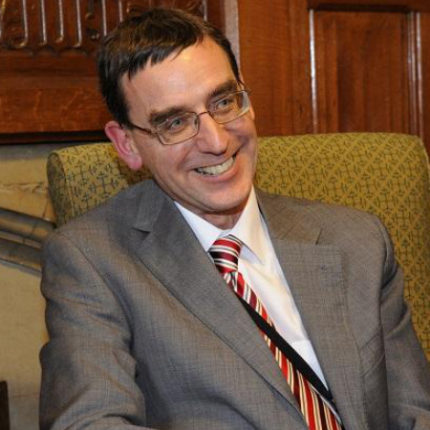
Stop us if you’ve heard this one. The entire funding policy of the English HE sector since the late 90s has been driven by a particular treatment of student loans within the national accounts. It flatters the deficit, moving the possible income from interest payments to the start of the cycle, and the costs of the write-off (the actual policy choice to subsidise a certain proportion of the loan book) into the 2040s. It’s why the UK has the highest student fees in the world and a byzantine income-contingent government backed loan system to help pay for it. Pullinger’s ONS is currently engaged with global statistical agency counterparts to develop a more accurate portrayal of this system of funding in public accounts.
Reporting some time over the next year, its conclusions could turn the throw-away line in the post-18 review remit, that any suggested new scheme must contribute to the lowering of debt and deficit, into a call for a rather more radical revolution for HE funding than Theresa May might have had in mind. Forget everything you know about the HE fees question to date, ONS could reset the dial. If it turns out that it’s “real” money that we’re spending on subsidising loans, and the fiscal illusion is really coming to an end, then we’ll need a completely new system to fund universities or face cuts and downsizing of the sector on a scale never before imagined.
And it won’t just be the English system – the future of income contingent loans, wherever they might be found in national HE systems, will be cast into doubt.
The treatment of international students in immigration statistics is another heavily politicised issue that falls to the ONS to pass judgement upon. There’s not currently any sign of a review being conducted on that, but the trouble with pointing to a statistical higher power is that they do, occasionally, make pronouncements that don’t go your way. John Pullinger, politically and in the sector, is an almost unknown figure. But nearly every major policy decision awaits the call he will oversee and ultimately be held accountable for.
read more... -
2.1 (was 1)
Michael Barber — Chair, Office for Students

For the second year in a row the former NUT policy officer performs well in our Power List, but has been pipped to the number one slot this time. He’s here not just in his capacity as a very executive chair of the Office for Students, having a much more hands-on role in shaping the growth and direction of England’s new regulator than HEFCE chairs of yore. As a writer and thinker about the “science” of policy delivery, processes drawing on his ideas now touch every aspect of the sector. Baskets of metrics, official and unofficial rankings, the correct functioning of the market and the mantra of choice seem to underpin nearly everything going on right now – though not all of these can be traced back to OfS, most of these bear the imprints of ideas put forward in his books “Instruction to Deliver” and refined in “How to Run a Government…”.
It’s not all been plain sailing though. Barber’s role in the Toby Young debacle (broadly, he was happy to argue and vouch for his joining the OfS board to the extent that checks that should have been performed were not) was uncharacteristically thoughtless, and he could and should have pushed back further on the No.10-directed highly political exclusion of NUS-linked students on the OfS board. After decades of making politics work behind the scenes these looked like missteps.
But it is no exaggeration to say that Barber’s concepts and ideas have underpinned everything we have learned about the way our new regulator will work. From access and participation, to quality assurance, even through to the way OfS measures its own performance – rankings, measures, and metrics are everywhere. A world of risk-led regulation. It feels commonplace because it is commonplace, so profound has been the influence of one man with a penchant for graphs and trajectories, and the ear of the elected.
But we need to keep a close eye on the independence of OfS under his watch. Early in his career in government he asked nonplussed permanent secretaries to draw up a “chain of delivery” – mapping how an idea would move from the brain of the minister to the experience of the service user with minimal friction along the way. It means there is a risk, however, in OfS being seen to be too quick to bend to ministers’ whims – as Ofsted has under DfE ministers for Labour, the Coalition and the Tories. HEFCE played an underappreciated role in moderating some of the dafter ideas emerging from Whitehall – if Barber wants to maintain a strong Power List ranking for a third year, we’d probably need to see some more visible signs of push back against the worst excesses of government interference in higher education.
read more... -
3.NEW
#nocapitulation — USS campaign hashtag

In a first, a hashtag has made the Power List. But #NoCapitulation was more than a hashtag. During the culmination of what was the first stages of a now protracted dispute over the USS pension scheme, the hashtag came to represent – on the face of it – the strength and depth of feeling and hurt among members of the scheme and what was being done to it. But it was more than that. As something to organise around, it made clear that the digital picket line was even bigger and louder than the actions on campuses.
And as more than that again, as the dispute became less about pensions and more about wider anger at the overall direction of the sector, it came to represent a groundswell of feeling that had been bubbling below the surface and was now coming to the boil, targeted not just at sector leaders, but at unions that were seen to have failed in their task in protecting their members’ interests.
Far beyond just USS member universities and not only amongst academic staff, over the course of the dispute it became painfully clear just how unhappy the UK HE workforce really is. And with morale at rock bottom, who could blame anyone for being angry at how their pensions scheme was being changed.
The dire state of sector industrial relations and the widespread anger over USS should greatly alarm anyone concerned with the health and future of UK universities. With TPS and LGPS, the other major pension schemes, about to get their own revaluations, and UCU gearing up for a bigger battle than usual over the annual pay dispute, the sector needs to brace for another turbulent few months for its fractured relations. And then its most urgent priority must be to heal the wounds and ensure that UK higher education becomes the fair, equal, supportive and happy place to work that it deserves to be, and a sector of which students, staff, managers and wonks can all be proud to be a part of. Nothing else will do.
read more... -
4.NEW
Philip Augar — Post-18 review panel chair

“Philip who?”, was the reaction when Augar was named chair of the expert panel on the Theresa May’s post-18 education funding review. The good-humoured, authoritative and intellectual Augar would never claim to be an household name or a education heavyweight – although he was on DfE Board for six years and was briefly bursar of St Catharine’s College, Cambridge. But he is an expert on broken markets. The former equities broker has spent two decades analysing the City’s systemic flaws, institutionalised failures and unethical practices and how all that contributed to the global crash in 2008 and all that followed.
Augar is playing his cards close to his chest on what his final recommendations might be. It’s tough to imagine, however, that his panel won’t tackle the collapse in adult and part-time learning; boost maintenance support; and creating a stable FE funding model. One emerging theme, hinted at, is reframing the language the current system is couched in. Badly understood policy is, after all, bad policy.
But the Power List panel had a heated debate about whether or not to include Augar at all – let alone rank him so highly. That’s because his review is at the mercy of such huge political forces that the recommendations could well be dead on arrival.
First, there is still no clear consensus in Whitehall about the main objective of the review. No.10 need a “retail offer” to compete with Labour’s pledge to abolish tuition fees and restore maintenance grants. DfE want broad funding stability given many universities’ precarious finances – but also needs to inject more cash into tech-ed. And the Treasury needs a post-18 system able to underpin regional growth, industrial strategy, and boost productivity. The end result is anyone’s guess.
Second, the review was commissioned and launched by Theresa May personally. So it likely needs her to be in power next summer to have real impact. If she is not, it risks sinking without a trace. Another Tory Prime Minister will want to “own” his or her reforms. Labour will rip it up and start again, given its pledge to abolish fees altogether. Either way, change will be slow – any reform won’t be in place before 2020 to 2021 at the earliest.
And third, Augar’s hands are tied. The panel cannot unpick the current system of income-contingent repayments. It has to stick within the current “fiscal framework” set by Treasury. And ultimately, it will need to fit with ONS’s changes to national accounts (see our number one entry this year John Pullinger). Perhaps the work of the review panel this year is just the beginning, Augar might need to keep working for some years to come to be able triangulate a real political consensus and true sustainability for the system.
read more... -
5.3 (was 8)
David Sweeney — Chief Executive, Research England

The 2021 iteration of the Research Excellence Framework began to feel much more real this year. We’ve seen a blizzard of consultations and documentation, setting out more rigidly the constraints and challenges of a very different system. It’s the biggest set of changes in research assessment since 1994 – taking the best points from the Stern review. Whether it fully addresses game playing or just changes the rules of the game remains to be seen. But more generally, we’ve seen the rise of a competent and capable new funder in the form of Research England.
With all of the convulsions and hand-wringing that has accompanied the painful birth of the OfS, it’s been easy to forget the myriad issues that their research counterpart has dealt with. Concerns about the Haldane Principle, a dilution of influence, and the near-inevitable flux of a new body joining another new body have all been addressed. Preparations for the Knowledge Exchange Framework are proceeding as sensibly as such a thing can, other funding allocations are continuing and expanding.
We never really understood the rationale for separating the research and teaching arms of HEFCE. But the early months of Research England suggests that it will be greatly to the sector’s benefit.
read more... -
6.5 (was 11)
Alison Wolf — HE commentator and researcher

Wolf remains one of the biggest hitters in education policy: highly respected, influential and regarded. And her standing grows year after year.That’s because many in No.10, Treasury and even the OECD share Wolf’s worldview that increased participation in HE has not resulted in increased productivity – and that there is a mismatch with skills and qualifications, with many graduates doing non-graduate jobs. For Wolf, it is highly regressive to require graduates today and taxpayers in future to keep investing in an inefficient system producing questionable outcomes. So there was initial umming and arring in No.10 about whether she should chair the post-18 review before putting her on the expert panel – following reservations from senior officials at DfE that she may push policy too far away from the current status quo.
It’s transparent, however, that the review’s final terms of reference are designed to arrive at the kind of policy solutions Wolf has been pushing for a decade-plus – the natural follow-up to her 2011 independent review of 14 to 19 vocational education for DfE.
Wolf has long-argued for a major rebalancing and streamlining of public subsidy from HE to FE and stopping the inexorable expansion of universities over all other routes to higher skills, particularly adult and community education. She wants a highly flexible funding and credit-based system, replacing the current HE tuition loan scheme with a lifelong tertiary education allowance – in part to tackle the catastrophic collapse in part-time and adult learners. And for her, that means putting apprenticeships at the heart of industrial strategy, not continually investing in short-term here-today, gone-tomorrow policy initiatives.
Despite all this, Wolf remains an enormous champion of her own university, King’s College London, as well as a staunch defender of wider academic freedom and institutional autonomy. She is watching OfS’ implementation like a hawk – both its extensive intervention powers and the default tendency of ministers who, as she told the House of Lords this year, “wish to tell the regulator precisely how to manage”.
The next 12 months will, no doubt, keep her busy.
read more... -
7.3 (was 4)
Nicola Dandridge — Chief Executive, Office for Students

Dandridge has has been energetic, forthright and proactive since OfS opened up shop this year. She’s built up a very strong in-house team. She’s engaged the sector from top to bottom. She’s beaten the drum for stable, fair, risk-based regulation. And she’s been crystal clear OfS will intervene robustly, whenever universities don’t act in students’ interests. This is crucial. Dandridge has had to tackle the lazy claim she is “poacher turned gamekeeper”, after moving from UUK to OfS. But conversely, she is dealing with complaints that OfS is at the beck and call of ministers chasing headlines on, say, limiting unconditional offers, reversing grade inflation or restraining senior pay.
The Power List panel was in no doubt that OfS will be a force to be reckoned with. But only time will tell the extent it will open up the market to new providers, whether it will protect quality and standards through the TEF, the extent it will use its registration to drive particular policy outcomes, and how it will triangulate competing interests and policy across the different UK nations.
First, the biggest challenge will be when faculties, departments and even universities start spiralling into ‘market exit’. Dandridge has been clear that bailing out failing institutions should not be placed above student interest – a big break with the past. But that may not survive contact with the political, economic and social realities. It’s an open secret that a growing number are running on empty. OfS will shortly be put to the test.
Second, Dandridge has set out a bold agenda on creating equality of opportunity – a cause close to her heart throughout her career. It has threatened sanctions against Oxford and Cambridge unless they show prove bursaries are helping poor students, not distorting the market by capitulating to the middle-class. It’s consulting on tough new access regulation and the rhetoric is clear: OFFA was too weak, progress far too slow and the system needs radical change.
And third, value for money remains the most difficult circle for OfS to square. Will the independent TEF review finally kill off the link between teaching quality and fees? Will OfS create real transparency on prices, costs and return on investment? Will it actively support students fulfil their consumer rights on, say, degrees falling short of their expectations or lost contact time during industrial disputes?
Finally, OfS’s credibility as a independent student champion will always be in question without real-life students knowing what it is and what it does. It’s all very well for Dandridge to insist OfS is not the “Office of the NUS”. But the regulator needs to do some very urgent building and engagement to be understood and taken seriously by students.
read more... -
8.6 (was 2)
Mark Walport — Chief Executive, UKRI

Here not so much for what he has done in the role – which has been solid and steady, if unremarkable and perhaps a tiny bit dull – but for the potential encapsulated within UKRI. For the first time, a single body supports the entirety of research in England – controlling the REF (and linked QR funding), third stream activity, project grants, and PhD studentships. The Chinese walls between the two arms of dual support appear to be holding, and the advent of a number of cross-disciplinary funding schemes suggest that government, via Walport, is getting to grips with the potential of a fully operational mega-agency.
One big sheet of paper in his in-tray concerns open access to research. UKRI has signed up to the oddly-named “plan S”, committing the UK’s research funder to a radical and fast-paced plan that delights advocates as much as it will annoy publishers (and some academics). More than anything, this requires skill and surefootedness to negotiate. OA is clearly the future but, as with much in life, the transition is everything.
It’s not all plain sailing. Governments in Cardiff and Edinburgh are concerned that the Englishness will suffuse the activity of the UK-wide individual councils, the place of the former Innovation UK still feels uncertain, and the general disinterest that initially greeted the launch of the Industrial Strategy
read more... -
9.NEW
Olly Robbins — Prime Minister’s Europe Adviser

If anyone has any control over the slow moving car-crash that is UK Brexit planning, it’s Olly Robbins. While politicians posture, prevaricate, and occasionally resign, it’s up to the PM’s Europe adviser to both make things happen and ensure that said things don’t have any unexpected consequences. A career civil servant who was Gordon Brown’s principal private secretary, he came to Brexit prominence as he led the (now 600 strong) Department for Exiting the European Union. His move to No. 10 denoted an increasing prime ministerial wish to take personal control of a process widely seen as shambolic. Indeed, the perception of Robbins as a creature of the PM is the only factor that now detracts from his dominance – how secure May is in her grasp of power is, at best, arguable.
Higher education – as a strong visible advocate for Remain, a textbook example of the folk-devil that is the “elite”, and as a beneficiary of the many European networks, collaborations, and funding streams that exist – has a lot at stake. How well Robbins understands and communicates the details and benefits of continued collaboration – to his European counterparts and within government – will be key in these fragile months ahead.
read more... -
10.=
Theresa May — Prime Minister (at time of writing)

We know it’s lazy to include a Prime Minister here – even a premier like May who is fighting for her position hour-by-hour, day-by-day, week-by-week. But Theresa May clings on both to No.10 Downing Street and the number 10 slot on this year’s Power List. We’ll set aside Brexit. And we’ve reported extensively this month on the Migration Advisory Committee backing her policy, in effect, to limit the growth of overseas students. But the issue which has dominated wonks’ agendas for months has been the post-18 review – a political exercise, driven fairly and squarely by May and No.10.
It was floated in the Tory manifesto last June but the first time it properly surfaced was a three point plan on the eve of its annual party conference last September: freezing maximum tuition fees at £9,250; raising the graduate repayment income threshold to £25,000; and above all, a root and branch review of the funding system.
The truth is May has never been an instinctive supporter of universities nor particularly interested in the intricate detail. But when politicians are on the ropes, they need to create room and breathing space to survive. It led to a odd position where she questions the value of degrees and acts as a guerilla activist against her own established policy. It signaled, however, she ‘got’ why she lost her Commons majority. It enables her to compete better Labour’s pledge to abolish fees and restore grants. And it bulks out out her offer to ‘just about managing’ families, if she survives after the UK leaves the EU.
The announcement was followed by months of wrangling within Whitehall, where the former Education Secretary Justine Greening and (more vocally) the former universities minister Jo Johnson fought to water down No.10’s plans and keep it as an internal assessment in DfE.
It culminated in May having to accept the former’s resignation (after a lengthy disagreement and the offer of several alternative jobs) and shift Johnson to another department – which freed her up to launch the review personally in February.
Will May be in No.10 when the expert panel reports? We don’t know. Will she be there to lead the government response and set out future reforms? We’ve got no idea.
Either-way, she or her successors face the same challenges: making tertiary education financially secure and sustainable; coordinating and integrating sub-degree and degree level education across FE and HE; and transforming the market for flexible and adult learning
read more... -
11.1 (was 10)
Jeremy Corbyn — Leader of Her Majesty's Loyal Opposition
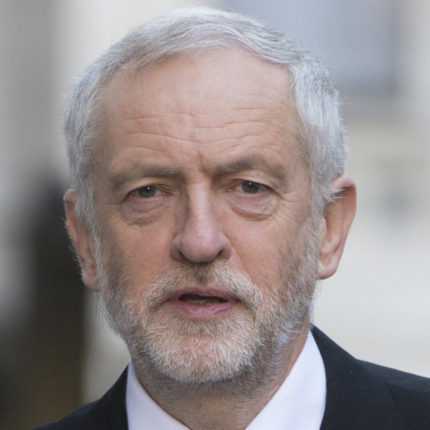
Agree with him or not, Corbyn has reframed the debate on post-18 funding. He has stoked No.10 panic ever since the election, with his deceptively straightforward manifesto offer last year: abolishing tuition fees; restoring maintenance grants; and free lifelong college education. And yet a dangerous attitude abounds in sector circles that it’s inconceivable Corbyn will ever be Prime Minister, so there is little need to think that hard about his pledges.
And that would be a mistake. Corbyn is no policy wonk, but abolishing fees is a flagship manifesto commitment he (nor any successor) will not resile from.
We live in extraordinary times. No one can say, hand on heart, who will be in power this time next year. No.10 want the post-18 review to neutralise a Labour attack line about privatisation and marketisation of HE – so at the very least, it’s hard to imagine fees will ever rise beyond the current £9,250 cap. That means HE cannot be left arguing for the tuition fee rises to fill in funding gaps when no major party in England has the will to deliver it.
Consequently, Labour’s policy wonks need constructive counsel on mapping out its National Education Service, the legislation underpinning it and the questions needing urgent answers. Will an abolition of fees lead to a decline in poor students enrolling, as in Scotland? How will universal free tuition impact on universities’ finances? Will we need to reintroduce student number controls? Will existing debt be written off? And how does all this fit into the new statutory regulatory system?
And yet the terms of the debate may change fundamentally if ONS force the government to include billions of pounds of HE funding into the day-to-day national accounts – suddenly, there will be much greater transparency about scale of public subsidy and the value to taxpayers’ (especially non-graduates).
This is all connected to a different vibe to political activism on campuses. There is a disconnect between frontline academics, professional staff, and management. We saw that the the size and scale of the UCU strike on pensions reflected the activism which Corbyn has harnessed since 2015. And we see it in more and more Labour Party student groups aligning with Momentum – and getting smarter about their campaigning tactics at the same time.
The Tories, scarred by losing Canterbury for the first in 99 years, want to take the fight to Labour in university towns (important, given young alumni populations). Universities will be THE crucial battleground at the next election, whenever it comes.
read more... -
12.2 (was 14)
Bob Kerslarke — Chair, Civic University Commission

Kerslake has thrown himself into his post-civil service life. And he’s had a busy 12 months – resigning as chair of King’s College Hospital Trust and fronting the inquiry in the Manchester Arena bombings, as well as a host of other jobs, including chairing Sheffield Hallam University’s governing board. But he has two important roles impacting on HE more widely right now.
First, he is working with Jeremy Corbyn and John McDonnell to prepare Labour for government. He and a team of former civil servants are producing a series of transition and implementation plans and the barebones of a first legislative programme. Labour’s proposed National Education Service is still a work in progress, particularly the long-term financing if tuition fees are abolished. Kerslake’s work behind the scenes will be crucial.
And second, he is leading the independent Civic University Commission, launched by the UPP Foundation in April, impressing observers by being genuinely proactive, energetic and hands-on.
Vice chancellors have long-resented the image of universities as remote, elitist, isolated ivory towers, but there are questions to answer about the social and economic disconnection which contributed to the Brexit vote.
So the commission gives sector leaders a platform to get the message out. Kerslake and his high-powered team have been touring the country to build up a robust model of universities’ economic, social and cultural leadership in cities and regions. And it will establish a practical roadmap that brings together several policy areas which are too often disparate – schools, NHS, job growth, welfare, industrial strategy, devolution, and regional regeneration.
The commission’s impact in Whitehall and Westminster risks, however, being limited given Kerslake’s role with Labour and his bitter exit from the civil service following big fall outs with No.10 and Cabinet Office. But the long-term legacy for HE could be crucial over the coming years.
read more... -
13.2 (was 15)
Anton Muscatelli — Vice Chancellor, University of Glasgow and Chair, Russell Group

Muscatelli’s term as Russell Group chair has not produced fireworks, neither should we expect it to have done. The group wields influence by projecting an air of unassailable excellence – its responses and statements stick to a rigid party line. But behind the scenes, Muscatelli is active and resourceful in lobbying both the Westminster and Scottish governments, working with the latter on its Brexit advisory group.
In an increasingly diverse sector, the Russell Group still holds power as a proxy for a certain kind of traditionally focused institution – one that’s continued dominance of state research funding has parlayed into a shorthand for lazy journalists, uninformed ministers, and below-the-line web commentators for “the good kind of university”.
How good such universities are in terms of the student experience, the civic mission, and – frankly – their treatment of staff during this year’s pension dispute, is an open question. The Russell Group’s advocacy of the restoration of maintenance grants was a rare – and calculated – policy position taken at odds with government policy. In usual times its value to members is as a powerful brand for recruitment and reputation, albeit an extremely expensive and often aspirational one.
read more... -
14.10 (was 24)
Susan Lapworth — Director of Competition and the Register, Office for Students

The OfS Director of Regulation and Assurance holds the keys to the kingdom – entry to (and exit from) the English HE sector. Retaining many responsibilities from her role at HEFCE Registrar (a key confidant of Madeleine Atkins in matters quality and regulation), her imprint can be seen in the increasing divergence of the English system from the rest of the UK. This has raised some protest in Wales and Scotland.
Contentious negotiations led by the formidable Lapworth meant what should have been an issue explored behind closed doors exploded into the press during the development of the UK quality code. But standing up for the new English regulator is squarely in her job description – Jo Johnson’s dreams of a data-driven regulated market become reality through her. On that metric, she’s one of the most important people in the sector right now – and she’s not about to let anyone forget it.
read more... -
15.6 (was 9)
Alistair Jarvis — Chief Executive, Universities UK

Jarvis has faced an almost impossible job this year. By a quirk of history – and likely hubris of past leaders – UUK is inexplicably responsible for representing institutional members of the USS pension scheme, despite the existence of a perfectly decent employers’ representative body UCEA, and despite the fact only a minority of UUK’s own members are part of the USS scheme.
And so it was UUK, led by Jarvis, in the firing line when the dispute ramped up earlier this year, derailing UUK’s ability to lobby for the whole sector to government on critical issues from Brexit to funding and beyond. The ferocious nature of the ad hominem personal attacks Jarvis faced on social media during the dispute would cause most people to walk away. That many of his own vice chancellors decided to throw him and UUK under the bus rather than suffer such opprobrium locally served mostly to make them appear self-interested and short-termist. But under the bus he went, a self-inflicted wound on sector cohesion and its external influence at a critical moment, seriously damaging UUK’s political capital and inevitably leading to a big drop down the Power List for Jarvis this year after several years of gains.
read more... -
16.NEW
Sam Gyimah — Minister for Universities, Science, Research & Innovation
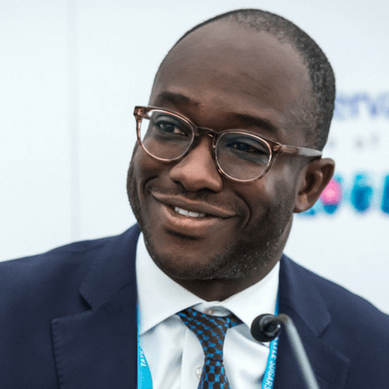
It’s easy to forget ministers are not all cut from the same cloth. Take the wonkish David Willetts (2010-14). He mapped out a massive university reform programme in opposition to bust open the HE market which crystallised in office around the Browne Review. Or Jo Johnson (2015-18), who oversaw a second wave of market and regulatory reform. He wanted to leave a legacy of systemic change which can’t be unpicked easily – taking Willetts’ policies to their logical end. And Sam Gyimah?
Frankly, there are questions about his engagement, knowledge and, frankly, his interest in HE.
On the one hand, unlike both his predecessors, he doesn’t have Green Papers, White Papers or significant Bills to front. The post-18 review is ongoing. OfS and UKRI are being set up. The heavy lifting is done and he has no new policy to flog.
On the other-hand, Gyimah sees this job as a stepping stone into Cabinet. He sees himself, potentially, as a future Prime Minister. So, like dozens of other ministers, his strategy is to furnish his CV for the next reshuffle post-Brexit (indeed, a new administration) in spring or early summer 2019 – to wit: his speech recently on “reinvigorating capitalism” to the right-wing Centre for Policy Studies.
So Gyimah’s #SamOnCampus tour is built to win brownie points with Tory powers-that-be, showing him listening to young people, particularly on mental health, while taking the fight to Labour on its own turf.
It’s smart positioning to be a self-styled consumer champion, what with “the winds of change” blowing through HE; this being the “The Age of the Student”; and branding himself “The Minister for Students” – all memorable lines so far.
And it is useful to be seen taking on vested interests by telling universities to stop sulking over Brexit or slamming unconditional offers, grade inflation, senior pay or courses with low graduate salaries.
Gyimah may have told vice chancellors he “loved” universities and degrees “are worth it” in his speech to UUK this month but the truth is that he has never sought leaders’, academics’ or students’ approval. Brexit, onwards and upwards, appears to be what’s on his mind.
read more... -
17.NEW
Edward Peck — Vice Chancellor, Nottingham Trent University

Edward Peck sits on the board of UCEA, the board of the University Alliance and the advisory board of the UPP Foundation. And he’s here as a very visible and active advocate for universities across many forms of media – a voice that is increasingly being listened to in high places. You wouldn’t have expected a post-92 VC to be the only senior sector representative on the DfE post-18 review panel – his inclusion demonstrates how times have changed.
His institution, Nottingham Trent University stands among a growing list that have long outgrown the “former polytechnic” stereotypes. A strong performer in teaching and research, and a growing international presence, the rise of Trent was aptly demonstrated by its placement above its more established neighbours in the 2019 Guardian league table. Trent has championed provision that spans the space between HE, FE and apprenticeships – a strategic decision that now seems preternaturally politically apposite.
read more... -
18.15 (was 3)
Janet Beer — Vice Chancellor, University of Liverpool and President, Universities UK

A fall this year for the Liverpool vice chancellor and UUK president – reflecting a bruising year of battles over pensions. As good a communicator as she is, 2018 feels like the year she’s taken a step back from the limelight, with UUK CEO Alistair Jarvis taking on most of the heavy lifting in the public eye and in the corridors of Acas.
Recently we’ve had a reminder of her strengths as she took on the cause of international students and the UUK proposals to reinstate post-study visas – a well received campaign that had been very carefully calibrated.
That the Migration Advisory Committee made significant (if less impressive) moves towards this was lost slightly in the general disappointment that international students would remain in the national migration target, for now.
Closer to home Liverpool, like many universities, experienced bitter and protracted industrial action over the spring – including a student occupation.
read more... -
19.NEW
Chris Millward — Director for Fair Access and Participation, Office for Students
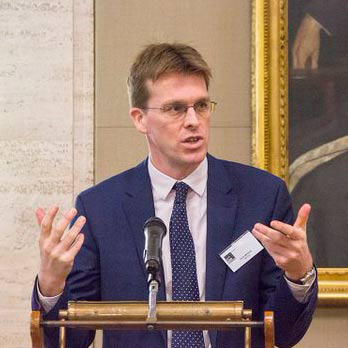
Everyone knows that OfS took over from HEFCE in April, but it is often forgotten that the former Office for Fair Access (OFFA) was also folded in. The post of Director for Fair Access and Participation is now a director of OfS but specifically named within the Higher Education and Research Act. And Millward, while not a figurehead of the new regulator in the same way as Barber or Dandridge, has been quietly effective in keeping access and participation in the public eye.
His access and participation consultation plays very much to the OfS house style – a longer cycle, more data, more targets and more trajectories. Millward successfully spans this into a call for a major improvement in diversifying student intake – the slow, if steady, progress engineered by his predecessors was clearly not enough. With most of his career spent at HEFCE, it would be easy to turn this into an accusation of career-driven ambition – those who have heard him speak will know that the director genuinely cares. And cares enough to make OfS use its teeth.
read more... -
20.NEW
Liz Truss — Chief Secretary to the Treasury
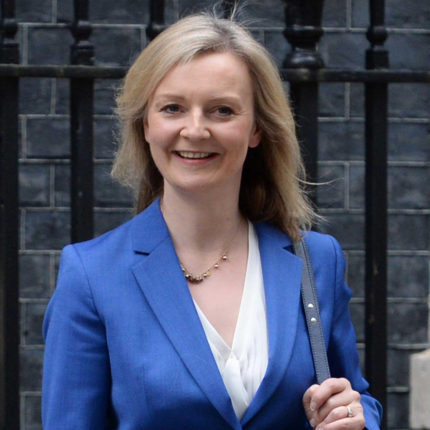
Truss is the steward for the public finances, tasked with doing the groundwork for next year’s Comprehensive Spending Review. Sure, the Chancellor will lay out its parameters in the Budget but it will be Truss, with the Cabinet Office, who is designing the process and overseeing the preparatory work across Whitehall.
So the spending review will be a battleground for HE in 2019, at the mercy of the known unknowns discussed across our Power List: ONS, the post-18 review; Brexit, as well as wider political and economic flux.
But we do know HE will be a low priority set against NHS, social care and the rest. There remains a hard-baked assumption universities have “had it easy” over the last decade, despite many institutions facing the financial squeeze and few Treasury operators have much truck with unrepentant, high-earning vice-chancellors.
It means the sector needs to be very smart in its sales pitch for public investment. It must target boosting productivity, regional economies and job creation and skills in a united front with the wider tertiary sector. It will be crucial to show efficiency and value to the taxpayer, particularly if ONS rules more HE funding must be counted in the day-to-day national accounts. And it will be good politics to frame all this as contributing towards a ‘Brexit dividend’ – which ministers will be desperate to “supplement” from other sources.
read more... -
21.NEW
Chairs of the Parliamentary Committee — Parlimentarian policy scrutineers

The 2017-2019 Parliament kicked off with the announcement of several inquiries covering higher education. With an administration trapped in Brexit interia – and with an opposition trapped in a state of general incompetence – it has been the parliamentary committees that have led the continued public scrutiny on the way HE is funded and managed.
Much of the news that Wonkhe has covered over the last year has been drawn from hearings during these inquiries. And you can be sure that Augar and the DfE review have read their findings with interest.
CEC – Halfon
CTC – Nicky Morgan
PAC – Meg Hillier
LEAC – Michael ForsythWe’re still waiting, of course, for the Commons Education Committee report on Value for Money in Higher Education. This will likely build on the work of the Commons Treasury Committee (Student Loans), the Public Accounts Committee (on the Sale of Student Loans, and the Higher Education Market), and the Lords Economic Affairs Committee (on the Economics of Higher, Further and Technical Education). Though perspectives have varied, it appears that it is the settled opinion of parliamentarians that some big changes need to be made.
What is interesting is that this is being expressed through committee reports rather than the Commons chamber. The Lords have been slightly more switched on to HE matters, but the difficult-to-digest process of Brexit seems to have killed off the possibility of democratic oversight in the traditional sense. We should probably be glad that we have these committees.
read more... -
22.6 (was 16)
Kirsty Williams — Cabinet Secretary for Education, Wales

The world is looking Wales’ way – and Williams’ vision in ensuring that Diamond is implemented in full makes the new student support regime a case study in fairness and affordability. Governments around the world (most notably in England and Scotland) have been taking a very close look at what Williams has achieved – and it will be no surprise if the Augar panel puts forward a version of Diamond for England.
The only Liberal Democrat in a Labour cabinet, her position was sealed with the promise she would be permitted to implement the entirety of the Diamond recommendations. The student support package that resulted – offering a guaranteed minimum income made up of means-tested grants topped up with loans – has been praised across the UK. Scotland’s student support review looked very closely at their findings, and political pressure over the maintenance underbelly of their free education position suggests at least some will be taken on board. However, with Carwen Jones stepping down as first minister in the autumn, Welsh wonks will be hoping that Williams remains unscathed in position.
read more... -
23.NEW
Michael Otsuka — Political Philosopher, London School of Economics
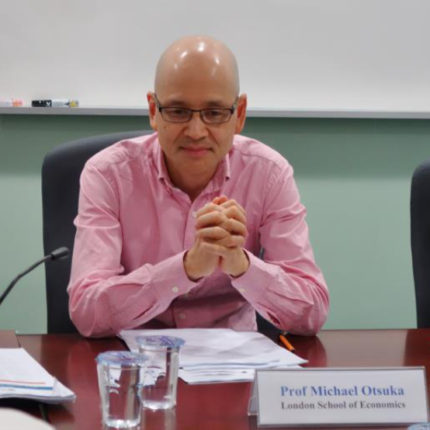
A pensions dispute means that all kinds of people turn out to be pensions experts. From union conveners to nervous institutional managers everyone has had an opinion on the intricacies of, say, valuation Test 1 (which generally accords with the speaker’s own preferences).Into this free-for-all has stepped a small number of genuine experts, with an even smaller number able to describe their position to the layperson on the picket line.
This latter group includes Otsuka, a political philosopher working at LSE who has enlivened and informed the debate with considered and intelligible blog posts, for Wonkhe, the superb USS Briefs, and others.
The fact that his writing on pensions is so far outside what we might consider his day job is simply testament to his flexibility and intelligence. We love finding experts in unexpected places.
The sheer volume of protest played a huge part in the slow and ongoing resolution of the dispute in the interest of USS members. But arguably an equal part was paid by the high quality analysis offered by those who had taken the time to get to know the field.
read more... -
24.NEW
David Lammy — MP for Tottenham
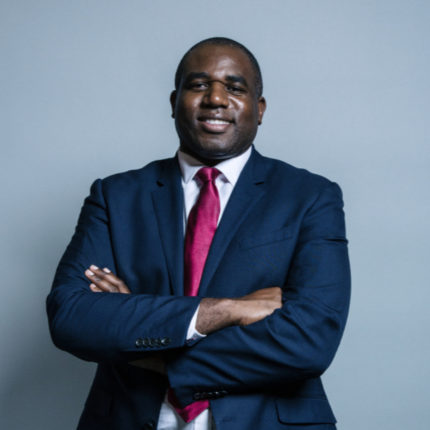
Lammy is a rebel with many, many causes: racism, gang crime, knife crime, gun crime; Windrush; Grenfell; and Brexit. His anger is palpable. “I will always try to be my own man”, he said last year. “People used to ask, Blair or Brown? I would say no, just black. That is who I am.” For him the personal is political and the political is personal.
And little has been more personal for the former universities minister (2007-2010) than his onslaught on Oxbridge’s admissions policies over the last 12 months based on his analysis of FoI returns.
Lammy argues their intakes are a national disgrace and that by any measure, they remain massively unrepresentative. His anger is palpable. They remain “fiefdoms of entrenched privilege”, “the last bastion of the old school tie” and guilty of “social apartheid”.
He’s been savvy – creating a media, political and public debate where there was little before; organising 100-plus MPs to demand Oxford and Cambridge make urgent reforms; and arguably, laying the groundwork for OfS to hold Oxbridge’s feet closer to the flame. Some wags argue he’s achieved more from the backbenchers then he ever did as minister.
Unlike Kehindre Andrews (No.37), however, he believes HE is capable of transforming itself, on race in particular – calling for Oxbridge to have centralised, not college-run, admissions.
Both universities argue change is underway and that Lammy’s attacks risk deterring would-be students from applying. Yet, fairly or unfairly, they have left an impression of being defensive, closed and reactive – getting sucked into arguing over Lammy’s statistical analysis, rather than leading big picture radical change.
read more... -
25.13 (was 38)
Emran Mian — Director of Strategy and Social Mobility, Department for Education
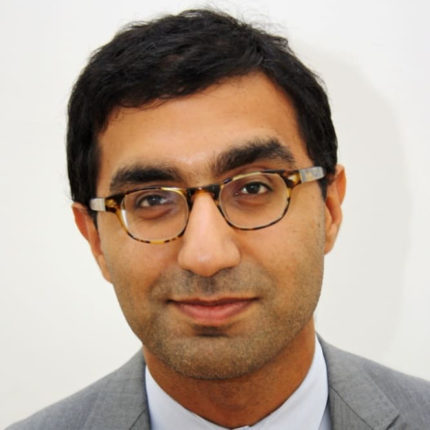
You could forgive senior civil servants for lying down in a darkened room after Jo Johnson finally left the building following two years of hyperactive reform – but the work of government never stops. So Mian has a full in-tray, when he steps up next month from Director of Strategy at DfE to acting Director General for HE & FE until the end of 2018.
The former Director of the Social Market Foundation will be overseeing major reforms to technical education, with the roll out of T levels and meeting the target of three million apprenticeship starts by 2020. DfE is leading the full post-18 review, which the department spent last autumn surreptitiously trying to water down. And Mian’s directorate is implementing the HE & Research Act.
DfE’s big tasks over the next year, however, will be securing a good departmental settlement in the Comprehensive Spending Review. The ONS decisions on national accounting rules will complicate this massively, if HE spending has to be channelled through DfE budgets. Early years, schools and colleges have had almost a decade of cuts so will be first in line for extra cash. DfE has been privately concerned by ministers’ habit of playing to the gallery in kicking vice chancellors – because it knows, sooner rather than later, it will have to deal with the reality of an institution heading over a cliff.
A change of government, of course, would mean all bets are off at DfE – implementing Labour’s flagship policy of abolishing tuition fees, while securing the sector’s financial sustainability and stability will be quite the conjuring trick but the sort that would probably appeal to the wonk’s wonk Mian.
Paul Kett, the current DfE Director-General for Education Standards, takes over the job permanently in January 2019.
read more... -
26.5 (was 21)
Jon Yates — Secretary of State for Education’s Special Adviser on Policy

Yates has been DfE’s main policy advisor since March 2018 reporting into Education Secretary Damian Hinds. Highly engaging and smart, he is a crucial advocate for vocational and technical education in the heart of government. His passion is inclusion and integration, embodied by The Challenge – the social enterprise he co-founded a decade ago, which created the template for the National Citizenship Scheme.
He set up the Social Integration Commission in 2014, which worked with big hitters across the political, policy and academic worlds to produce a series of hard-hitting reports. He’s also been at the sharp end as an apprenticeship provider, creating a one-year programme, Step Forward, for 17 to 20 year-old Londoners to build professional networks.
Yates combines big picture thinking with a hard-edged pragmatism about how policy is delivered on the ground and has won respect and trust from ministers and civil servants alike. Diana Beech and Stian Westlake (No.30), might well be better known to HE wonks – but Yates is key in better linking university policy to DfE’s priority areas.
read more... -
27.NEW
League Table Industry — A pack of rankers

That’s the disparaging term for an industry that now wears it as a badge of ironic pride. But league tables can’t be ignored, as the influence, particularly of global rankings, continues to grow in governments around the world and financial institutions that use them as a shorthand for credit-worthiness and bond ratings.
Many VCs see a good league table place as the crowning achievement for their institution – with some happy to look at often spurious interpretations of literally any league table to do so (a practice now closely monitored by the Advertising Standards Agency which is cracking down on universities that misrepresent league table data in marketing materials). Others prefer not to talk about them at all – either because they’re not getting the placement they’d like, or for those that consistently perform well – it’s seen to be all a little bit unseemly.
Close observers of university boards of governors despair at how lay members attach so much importance to them, with countless university strategies calling for league table rises that are unlikely or impossible to ever take place – and more likely to divert thinking and resources away from true core strengths and financial sustainability. Academics generally treat them with disdain for bringing further evidence of marketisation to the sector – and for the occasional questionable statistical leap into the unknown.
But despite big ongoing debates about methodology and reliability, the UK’s major league tables are commendably free from bias and operate at the reputable end of the global industry. Disagree with them or not, the methodology is usually clear and there is no suspicion of pay-to-place. Sadly, the same can’t be said for much of the rest of an industry that continues to extend its reach and influence around the world.
read more... -
28.3 (was 25)
Amatey Doku — Vice President (Higher Education), National Union of Students

Re-elected in the most recent NUS elections, Doku has been seen widely at sector conferences, events and meetings. Adopting a smoother and more wonkish style than his president Shakira Martin (#), he has proved to be highly influential – capturing the respect of student leaders and sector actors alike.
Doku has used his influence to cause real action on the black attainment gap both inside member students’ unions and across the sector – and while his choice to dedicate the second year of his incumbency to campaigning for a second referendum on Brexit has raised a few eyebrows, he’s been a real asset to a campaign which many initially wrote off.
The last former Cambridge president to hold the office of NUS vice president HE went on to become NUS president (and then an MP). Given a surge in popularity among groups like Momentum, Doku will have a battle on his hands if he is to follow a similar path.
read more... -
29.17 (was 46)
Rosie Tressler — Chief Executive, Student Minds

Student Minds has built a strong reputation under Tressler’s leadership over the last three years, growing from a grassroots network to winning ministerial backing to establishing a national Mental Health Charter. It is working very closely on UUK’s Step Change pilots at UWE, Cardiff and York, establishing a robust model for mental health provision, which can be rolled out nationally. It is setting up a major programme on male mental health and is working with DfE on smoothing the transition students face in their first year.
But Student Minds’ strength remains its ground-up approach in building partnerships and campaigns in connecting students; accommodation providers; estates teams; students’ unions; faculties and departments; and student services. It’s a huge step forward and these issues are now in mainstream debate.
Ten student deaths by suicide in 18 months at Bristol generated sustained public debate over the extent universities are “in loco parentis” with DfE floating if they should share information on students mental health with parents or guardians. And massive structural challenges remain – historic underinvestment in NHS, the lack of integration between students’ home and university GP practices, and the estrangement between adolescent and adult mental health services. Student Minds has never been so needed.
read more... -
30.11 (was 19)
Diana Beech & Stian Westlake — Policy Advisers to the Minister of State for Universities, Science, Research and Innovation, Department for Education

Many senior civil servants feel pretty bruised after all the recent shenanigans, reporting an “end of days” feel in Whitehall in the run-up to Brexit characterised by a wariness, if not lack of trust, between ministers and those who serve them. So policy advisers, appointed by ministers, are crucial in bridging the gap behind the scenes – and key targets for policy leads and lobbyists.
It was important Gyimah (#) retained Westlake to ensure continuity on the science and innovation brief at BEIS. The energetic Westlake was a Jo Johnson-appointment but had collaborated previously with Gyimah on a report on banking reform. Westlake remains a bold, independent thinker with his latest book Capitalism without Capital praised by Bill Gates no less. Westlake is a no fan of short-term policy wheezes or political positioning – an important reality check within a minority government.
And Gyimah then won an internal battle at DfE to have another policy adviser, rare for a Minister of State. Beech, former Director of Policy at HEPI, starts this month, covering higher education policy. It’s a move widely welcomed across HE wonk-world, given Beech’s established credibility across the sector and wider questions about how much Gyimah is actually plugged into HE.
read more... -
31.NEW
Josephine Cumbo — Pensions Correspondent, Financial Times

The Financial Times’ pensions correspondent became a Twitter must-follow during 2018. With well-placed and timely sources on both sides of the dispute, a tweet from Cumbo could shape the interpretation of every twist and turn of the complex debate. Cumbo has a remarkable ability to get to the nub of what’s going on, quickly capturing the gist of detailed reports, claims, and counterclaims.
Such is her standing that we were shocked when her tip about the release of the JEP report failed to come to pass on the day in question. But one day out is still substantially better than anyone else did.
This year has seen her land numerous awards for her work – notably she is “social media influencer of the year” in the Professional Pensions “Women in Pensions” Awards. For someone covering a disagreement that at least partially took place within the columns of Tweetdeck rather than in newspapers, such skills catapult her into the HE Power List this year.
read more... -
32.2 (was 30)
Janice Kay — Senior Deputy Vice-Chancellor, University of Exeter

What will subject TEF look like? So far, the pilot has been carried out in great secrecy, under the leadership of Kay. Last year, both top down and bottom up approaches were trialled, this year OfS will test a “specific assessment” model with refinements. Quite what will come out of this is a matter of considerable interest – it could add a level of refinement and value to a TEF often criticised as broad brush, but it also runs the risk of venturing into the statistical noise of small samples and low-quality data.
-
33.13 (was 20)
Robert Halfon — Chair, House of Commons Education Select Committee
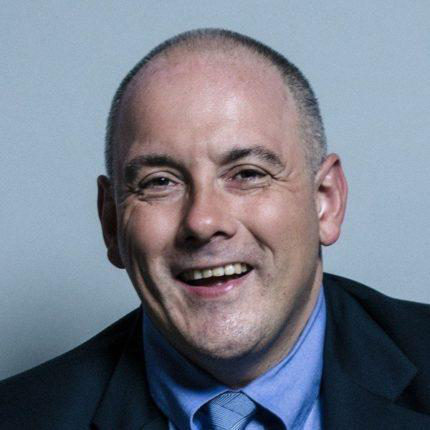
Halfon has fully embraced chairing the House of Commons Education Select Committee in the last twelve months, refusing to sulk over his ministerial sacking 15 months ago. First, his condemnation of DfE over Toby Young’s chaotic appointment to the OfS Board was the straw that broke the camel’s back. No.10 couldn’t risk Halfon’s committee ambushing ministers live on TV by reading out Young’s most offensive tweets one-by-one. It was also the final excuse to shift Jo Johnson to DfT – if the PM needed one.
Second, Halfon’s Value for Money in Higher Education inquiry reports this autumn and is expected to be damning, judging by his grilling of witnesses in oral hearings on topics such as senior pay, teaching quality, adult and part-time enrolments, return on investment, and the impact of access funding. He has railed throughout against the HE’s “obsession” with academic degrees, so we should expect the committee will push for more active OfS intervention – despite the sector lobbying hard to stress the extent of existing technical, vocational and professional training.
And third, Halfon’s demand for a “skills revolution” shows a growing political consensus on expanding the HE in FE model. It’s in line with Treasury’s approach to industry strategy, boosting productivity and regional growth. And Halfon’s broader framing of lifelong learning as underpinning social justice (his so-called “ladder of opportunity”) cuts across the political spectrum. It’s what links his wider thinking – that GCSEs should be abolished, A levels replaced with a baccalaureate and undergraduates should study maths – regardless of their degree.
His return to frontbench might not be that far away either – given his tight personal and professional friendship with tipped potential future Tory leader Sajid Javid.
read more... -
34.NEW
Joanne Segers — Chair, USS Joint Expert Panel

Thrust into the sector limelight when appointed to chair the intently scrutinised USS Joint Expert Panel, Segers is impeccably qualified for this extremely difficult and demanding role. The conclusions she oversaw brought a measure of comfort to those who have been campaigning on questions of the previous valuation of USS, but it is the strength of her personal reputation that meant that both sides largely accepted her findings as they were published.
Segers graduated from what is now Liverpool John Moores University, and started her pensions career at the Trades Union Congress. She also boasts stints at the Association of British Insurers and the National Association of Pension Funds. An admirable CV and the reason she was such a clever choice as the head of JEP – both sides feel like she is one of their own.
read more... -
35.1 (was 34)
Alex Proudfoot — Chief Executive, Independent Higher Education
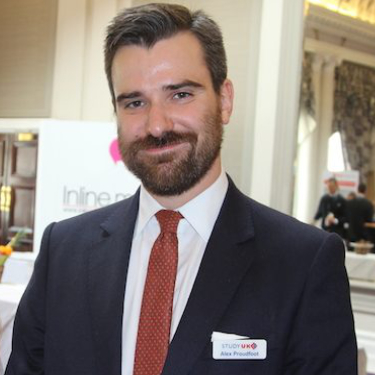
Proudfoot’s in the right place at the right time, given the new regulatory architecture is built to open the market up to new providers. But his small organisation faces an existential question of what binds together Independent HE’s disparate membership of profit and non-profit providers – and what really differentiates them from the established sector, if OfS registration puts providers on a level playing field. The challenge remains his members not seeing themselves as a cohesive sector.
One option might be evolving into the HE-equivalent of New Schools Network – to attract new providers into sector, hold their hands through registration process and support OfS and DfE’s own policy and delivery teams. Or another option is IHE leading a broader rebranding and repositioning of the independent sector as a whole – enabling its members to scale up their marketing and promotion activities.
read more... -
36.6 (was 42)
Sally Hunt — General Secretary, University and College Union

For someone at the head of a trade union who won a series of notable victories through solidarity in industrial action, it’s been a peculiarly difficult year for Hunt. At many times during the campaign over USS, particularly around the first (#nocapitulation) proposal, she appeared to be less popular among her members than UUK.
It is, to be fair, difficult to strike a balance in a union comprised of members as ornery and individually outspoken as academics – actions that pleased moderates enraged the far left, and vice versa.
And what on earth happened at the UCU congress? What should have been an inspirational and even celebratory event for organised labour winning victories and earning popular support descended into a – from an outsider’s perspective – complete farce of infighting and union procedural politics, losing the entirety of the HE day due to a walk out by UCU staff. Unlike many others in public service unions, Hunt is centrist by instinct and conciliatory in action – in normal years this is a strength in successfully negotiating with senior leaders on pay and conditions. But 2018 was not a normal year.
read more... -
37.NEW
Kehinde Andrews — Associate Professor in Sociology, Birmingham City University
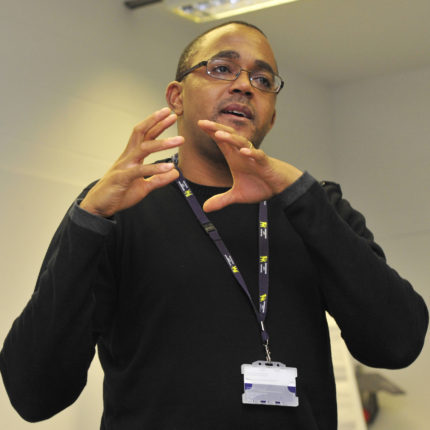
Andrews’ hero is Malcolm X. So he will utterly reject being on any Power List. Or even the premise of a Power List. Andrews’ academic and public mission is to challenge established institutions which he argues are inherently structurally and systemically racist – chief among them universities.
There’s clearly a case to answer: there are only 25 black woman and 85 black men among the 18,000-plus professors in the UK and stark racial inequalities in degree attainment, graduate earnings, pay gaps, and career progression.
For Andrews, however, the answer is social change – rather than treating the symptoms, through better representation or widening participation or kicking out racist students or staff.
That’s why he fought for and launched Black Studies at Birmingham City University in 2017 – the first in Europe. Institutions such as universities are incapable of reforming society, he argues. But academics like him have a platform and responsibility to equip others to be agents of change, building wider radical, organic, activist movements.
And it’s clear Andrews is tapping into a wider mood on campuses: the Why Is My Curriculum White? and Why Isn’t My Professor Black? campaigns at UCL; #rhodesmustfall at Oxford or demands to decolonise English at Cambridge. HE’s leaders will reach a point when they can no longer ignore all this. Something big is stirring.
read more... -
38.11 (was 49)
Andrew McGettigan — Independent Journalist

McGettigan is now firmly established as one of the leading and vocal experts on the way HE funding is treated in public and departmental accounts. A fascinating niche even in quieter times (who could fail to thrill to the multiple redefinitions and eventual disappearance of the RAB charge?), the issue of the ONS-backed international analysis of the treatment of the UK’s time-limited, income-contingent system has made his regular articles for Wonkhe (and his own blog, Critical Education) essential reading for those looking beyond the politics to the money that drives them.
-
39.10 (was 29)
Mary Stuart — Vice Chancellor, University of Lincoln

The power of the story of Stuart’s journey to her current role is neatly eclipsed by the talent and consideration she brings to her role. The University of Lincoln has flourished, if not been utterly transformed under her leadership, her 21st Century Lab is a timely intervention in the debate around the future role of universities, and her frequent appearances elsewhere (not least on Wonkhe) are always welcome for this widely-liked vice chancellor.
-
40.8 (was 32)
Nick Hillman — Director, Higher Education Policy Institute
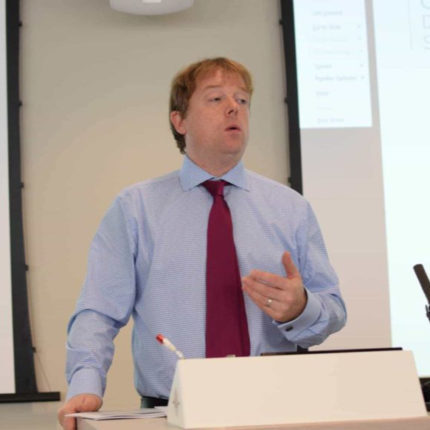
Hillman has built HEPI into arguably the best version of the think tank since it was founded and funded by HEFCE all those years ago. It drives agenda-setting policy underpinned by solid research and analysis and strong, proactive publicity. It’s no wonder Sam Gyimah has just poached its director of policy.
Hillman has fronted major interventions on widening participation, freedom of speech, skills, and part-time students. But he’s never afraid to host more radical progressive opinion on HEPI’s platforms – drawing together thinking from centre-left and centre-right. And the HEPI’s annual Student Academic Experience Survey with Advance HE remains a key barometer of value-for-money even though OfS is now up and running.
Hillman himself remains a leading go-to policy commentator respected for his pithy sound bites as well as insider knowledge of Whitehall and Westminster. He worked closely with his old boss, former Universities Minister David Willetts, on A University Education published last autumn – and which is dedicated to him. It’s one of the must-reads for wonks about HE’s past, present and future.
read more... -
41.14 (was 27)
Alison Johns — Chief Executive, Advance HE

Advance HE has a big twelve months ahead under the highly regarded and respected Johns. Bringing together existing agencies Leadership Foundation, Higher Education Academy, and Equality Challenge Unit, it’s going to prove a tough road to create a compelling overall vision and strategy and membership model that can gather the support it needs in the sector.
On the one hand, merging three agencies with distinct remits, subscription models, and histories is no easy job. There have been significant staff and budget cutbacks to erase duplication and to lower the overall subscription cost of its transitional year before running new programmes from August 2019. It is to Johns’ credit that this has been accomplished without any of the public laundry airing that characterised similar mergers in HE history.
On the other hand, Advance HE needs to offer the sector real solutions to the challenges ahead – where does Athena SWAN, Race Equality Charter, Fellowship of HEA or any other existing programmes fit in the new OfS-led world? How will it equip leaders and governors to manage the tougher regulatory structure? And how will it enable the sector to deal with known unknowns on the horizon – the post-18 review, Brexit, financial instability, industrial strife, and the rest of it? A lot hinges on success of Johns’ ability to make Advance HE a critical asset to the sector in these turbulent times.
read more... -
42.NEW
Jeremy Farrar — Director, Wellcome Trust
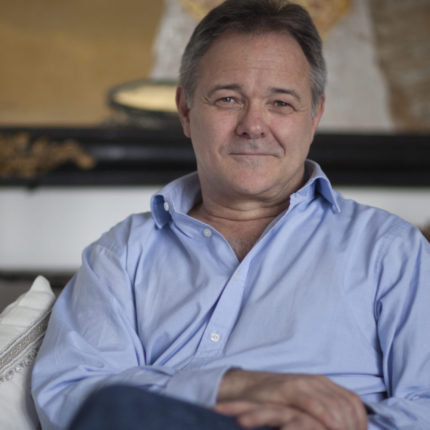
Research funding policy interest has been understandably focused on the formation of UKRI. But in a way, that misses the point. Bit “machinery of governance” style changes can be fascinating to watch, but often also mean that the foot is taken off the development of policy. Plan S surprised us with its ambitious scope – but even if it was implemented in full by UKRI it would just mean they were catching up with the open science policies of the Wellcome Trust.
The Wellcome Open Research platform allows the researchers it funds to rapidly share articles and underlying data – with immediate publication and transparent refereeing. Publication costs are directly covered by Wellcome itself. This neatly avoids article processing charges and publication delays – and although Wellcome still supports other forms of open publication you genuinely have to wonder why – in a saner research world – they would need to.
A Royal Society Fellow and a Fellow of the Academy of Medical Sciences, Farrar has the credibility and background to pull this off this radical change in research practice at the UK’s largest independent research funder.
read more... -
43.31 (was 12)
Chris Husbands — Vice Chancellor, Sheffield Hallam University and Chair, Teaching Excellence and Student Outcomes Framework Panel

What a difference a year makes. TEF year 2 set the world alight, whereas TEF3 slipped out with nary a shrug from HE commentators. Whether it was the frequent changes to the rubric making the competition less reliable, or the strategic decisions that led to entry decisions, or even the bizarre change of name (to Teaching Excellence and Student Outcomes Framework) – we can be sure that the standing of the panel chair was not a factor.
Husbands has been a visible front-person from the start, arguing with conviction that TEF awards are meaningful and valuable. He’s combined this role as the public face of a key government HE policy with his day job at Sheffield Hallam – a post-92 university giving lie to the stereotypes and forging a distinctive, high-quality offer. A key quote from his speech welcoming delegates to the UUK conference was repeated on stage by Gyimah (#) – demonstrating the esteem he is sometimes held in.
But is TEF (TEaSOF?) still the force that it once was? Husbands’ role was to launch the exercise and provide initial credibility. These days, he takes more of a back seat, hence his lower ranking.
read more... -
44.19 (was 25)
Shakira Martin — President, National Union of Students

Only the second NUS president to have attended a further education college instead of university, Shakira was re-elected by a huge majority at NUS conference earlier this year. Her style is forceful and passionate, but that approach belies more moderate and pragmatic political views than many of her rivals – exemplified in an interview for Radio 4’s Nick Robinson earlier in the year on a podcast series reserved normally for major politicians.
Most NUS presidents tell stories of overcoming adversity, but Martin’s inspiring (and genuine) story of the power of education to break a background of hardship and poverty in south-east London is compelling and impossible to ignore. Her “listen, learn and lead” approach has captured the imagination of student officers, and another of her stump phrases – “it’s about getting in and getting on”- has been adopted wholesale by Chris Millward in his OfS access role.
Martin’s combination of effectiveness and authenticity is a real rarity for NUS, and shone through in NUS’s Poverty Commission report this year – a significant contribution both to the post-18 review and wider decision making across government, institutions and both sectors. In what is constitutionally required to be her final year as an NUS officer she has been inevitably adopting a lower profile, taking the time to address longer-term internal issues in the union. But once Phillip Augar’s review is out in January, her leadership of students’ unions on maintenance could make a significant difference to the government’s response.
read more... -
45.6 (was 39)
Lucy Hunter Blackburn — Writer and former head of HE in the Scottish Government

After a significant period of torpor, HE in Scotland appears to be becoming active again. Unfortunately, as soon as Shirley Anne Somerville began to get grips with the thorny issue of student support, her promotion (and the subsequent issue with her successor) meant a summer without ministers – new boy Richard Lochhead has a lot to pick up and quickly.
All this explains why we have a freelance writer on the Power List rather than a minister representing Scottish HE – it can sometimes feel like she’s the only one keeping the show on the road. And though we are glad to work with our 2017 Wonk of the Year, her placement puts the rest of the Scottish sector on notice – we need more people like Hunter Blackburn.
read more... -
46.NEW
Jess Wade — Early Career Researcher, Imperial College London

Jess Wade is an early career researcher in solid state physics, but is featured here for her contribution to STEM outreach. By recognising the careers and achievements of female scientists in Wikipedia articles, she paints a more accurate picture of the enormous contribution and potential of women in STEM.
She is scathing on attempts to “feminify” science (“pretty smart”, anyone? “hairdryer science”?) and Wade’s commitment to showcasing the quality and value of research must have done more to inspire the next generation of researchers than any number of flashy PR stunts.
read more... -
47.16 (was 31)
Gordon McKenzie — Chief Executive, Guild HE

GuildHE grows its membership and hits above its weight for another year. And that’s down to McKenzie’s pragmatic, sensible, and clear leadership – drawing on all his Westminster and Whitehall experience. Vice chancellors in other groupings may too often get sucked into trying to create dividing lines between themselves and other parts of the sector to justify their subscriptions.
GuildHE and McKenzie, however, have a much more outward looking and politically acute perspective: a promise to build and champion a diverse HE sector, supported by an established policy platform, a solid advocacy operation, and strong retail offer to its members. GuildHE is in the right place at the right time as OfS establishes itself and has worked hard behind the scenes to make sure new providers are not being set insuperable barriers or get a fair crack of the whip in TEF.
GuildHE also still “co-owns” the established infrastructure – including nominating member VCs and principals to the governing bodies of key organisations from the QAA to HESA, Advance HE to Jisc.
read more... -
48.13 (was 35)
Douglas Blackstock — Chief Executive, QAA
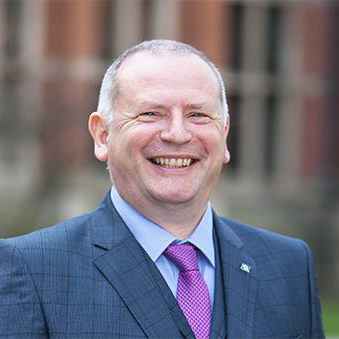
A slight fall for Douglas Blackstock of QAA here. But navigating towards a successful conclusion to the Second Quality Wars, and preserving the integrity of a UK-wide quality assurance system in the face of some (questionable) policy decisions, all the while expanding international work and retaining ENQA certification has made this quite a year for the Gloucester-based designated quality body.
He has a talented team around him, but Blackstock’s political skills have arguably done his agency and the sector a lot of good. But how much influence will a UK-wide quality agency have in coming years as the home nation sectors continue to diversify?
read more... -
49.34 (was 15)
Anthony Seldon — Vice Chancellor, University of Buckingham

It’s telling Seldon still ruffles other VC’s’ feathers; – he remains one of the most energetic, influential and innovative thinkers on the education policy scene. Year-in, year-out he rails against the “monolithic” exam system; “factory schooling”; and ministerial meddling. And as ever, he advocates passionately for “character education”, wellbeing and resilience, and lifelong learning. So it’s no surprise Seldon’s interventions in the last 12 months have been characteristically headline-grabbing – embodying Buckingham’s “challenger” brand.
First, he argues HE is “fiddling while Rome burns” in ignoring drug-use, pledging to create the UK’s first drug-free university through enforceable contracts, tackling peer-pressure and better education. Second, he urged HE’s leaders to embrace artificial intelligence’s potential to transform the economy, society, and democracy – articulated powerfully in his book The Fourth Education Revolution. And third, he’s slammed his fellow vice chancellors, arguing HE only has itself to blame for tougher regulation. He despairs of their “embarrassing” and “humiliating” tone-deafness in defending pay awards way above their own staff’s agreements – Seldon’s own salary was cut to £150,000 in 2016.
Too many leaders, he argues, live in an echo-chamber – instead of (like the man himself) fighting for social justice, greater diversity, and inclusion, and transforming mental health provision.
read more... -
50.NEW
Aleksandr Kogan — Data Scientist, Cambridge

If the Power List had an impact weighting Aleksandr Kogan would be towards the top – how many others could be fairly described as having made a material contribution to the election of Donald Trump (and in the popular imagination, Brexit)? As the Cambridge academic who developed the social media profiling tool that gathered research data for Cambridge Analytica, Aleksandr Kogan represents the idea that academic standards and ethical norms have, if broken, far-reaching global effects.
There’s been a lot of university bashing over the last two years – in the most part we see this as the politically-motivated attack it is intended to be. But on breaches of research ethics and research integrity, academia deserves all the criticism it gets – if not always the politicians it deserves.
read more...



